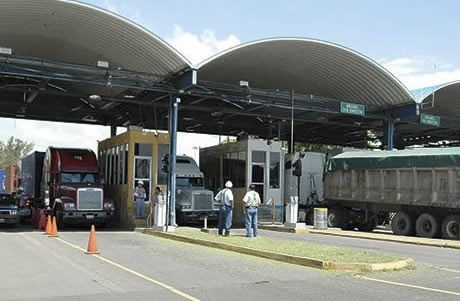The Governments of Honduras and Guatemala expect to enforce in full the Customs Union next year, thus becoming the first regional economic block, concentrating about 43% of the Gross Domestic Product (GDP) in Central America.
The Customs Union agreement was signed on the 26th of February of this year in Tela, Atlántida, on the Honduran Atlantic shore, by Presidents Juan Orlando Hernández and Otto Pérez Molina.
The process will be developed gradually, and will lead to a total elimination of border crossings between both countries, being expected to implement immediately border facilitation procedures, such as the expedite crossing of people and commodities.
The Customs Union will permit a faster movement of merchandise, people and investments, but also poses several challenges with regard to security, complementarity of policies, market regulation, monetary harmonization, consumer rights and competition
Which will be the significance of the Customs Union between both countries from a social and economic point of view?
The objectives sought with this Union include the industrialization of the region and foreign investment, leading to progress of the inhabitants and, in particular, to better economic conditions for them.
Which specific benefits will the Customs Union provide to the people of these countries?
The purpose is to achieve free circulation of goods and services and expedite the entrance of persons and merchandises into each signatory country, thus avoiding long bureaucratic proceedings.
Another purpose is creating attractive conditions for future investors and achieving the industrialization of the zone, and achieving it would result in an increased flow of foreign investment. It would promote productivity as well as investment in small and medium-sized companies, benefiting the people of the region.
Which would be the advantages for the entrepreneurial sector of both countries?
Fewer proceedings and shorter waiting times in Customs offices on the border between Guatemala and Honduras, more freedom of transit for independent merchandises and expansion and better operation of the local market, which represent savings in transportation and storage costs, as well as saved time by avoiding endless bureaucratic proceedings at the border offices of each of the signatories countries.
It is important to mention that this will result in a better flow in the transit of goods, products and services between both countries.
It has been firmed that the borders will be open for merchandises and persons, but there are products that are not covered by the Customs Union (sugar, coffee, fuels and beverages). Which would be the reasons for not including them?
The reason is that such products are under an internal regime of each signatory country which requires them to keep the current tariffs on them.
With regard to the unifying process developed by European Union countries, which would be the lessons to be learned from it in the process of regional unity? Will it be an example for the countries of the region? Which would be the positive lessons that might be learned from it?
The standardized enforcement of Customs regimes and destinations, based on standardized regulations by means of a Community Customs Code, as well as free movement of goods without exceptions regardless of the origin thereof, once they have entered any member country, the free trade of services, and the existence of a common external tariff.
Posted By: Ministry of Economy Guatemala

